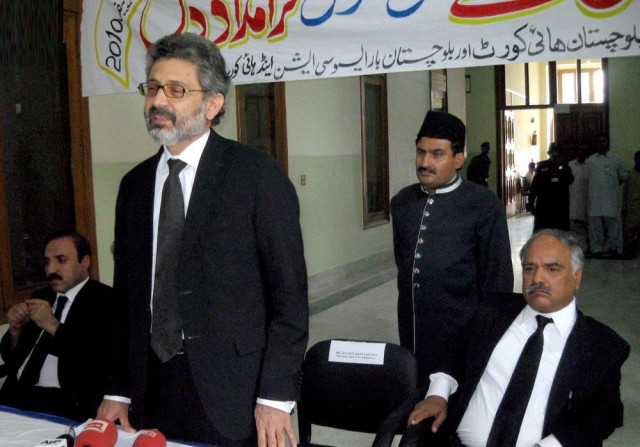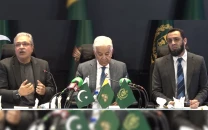Strict liability not applied universally, argues Justice Isa
Calls upon SC to make every effort to dispel any impression that different persons are treated differently

Justice Qazi Faez Isa of the Supreme Court has raised serious questions over the jurisprudence evolved in view of Panama Papers verdict regarding the disqualification of lawmakers
PHOTO: NNI
“Justice must not only be done, but be seen to be done as well. Every endeavour, therefore, should be made to resolve the prevailing legal uncertainty. The eligibility of members of parliament should be decided in accordance with one single and definite measure,” says Justice Isa in his 27-page dissent note. He also raises seven questions while recommending that a full court settle uniform principles for the applicability of Article 62(1)(f) of the Constitution.
Justice Isa previously wrote dissent notes in high profile cases such as the 21st amendment case, the houbara bustard case, and on a matter related to the chief justice’s discretionary power to entertain public interest litigation. He also authored the judgment on the dismissal of NAB’s appeal regarding the reopening of the Hudabiya Paper Mills case against the Sharif family.
SC dismisses petition against Sheikh Rasheed
Justice Isa believes that the court in the Panama Papers case clearly applied the strict liability principle, but it did not follow the strict liability rule in PTI chief Imran Khan’s disqualification case.
Legal experts say that Justice Isa’s opinion may have been written a couple of months ago before a larger bench issued a verdict wherein it is held that disqualification under Article 62(1)(f) of the Constitution is for life.
Justice Isa says that there are judgments of this court which apply the “principle or rule of strict liability” and hold that any nondisclosure or misdeclaration results in disqualification, giving the Panama Papers cases as examples.
Interestingly, Justice Isa has elaborated the Panama Papers case proceedings into three parts by highlighting discrepancies in the judgments. He has also reproduced the particular portions of each judge on the Panama bench to highlight their conflicting views on the applicability of Article 62(1)(f) of the constitution.
He says that once the facts of a case have been ascertained, the applicable law is applied to arrive at a decision. However, when the facts are clear, but different benches comprising the same number of judges take divergent views, the matter needs urgent resolution, he explains.
“Another question which requires determination is whether the matter of nondisclosure or misdeclaration is to be treated differently if the case is heard by the Supreme Court in its appellate jurisdiction (ROPA Section 67(3)), from a case heard by this court in its extraordinary original jurisdiction (Article 184(3) of the Constitution). There is yet another matter which needs to considered and conclusively settled.”
According to the judge, Article 184(3) of the Constitution states that only matters of “public importance with reference to the enforcement of the Fundamental Rights” can be attended to by the SC unilaterally.
“When a High Court passes an order under Article 199 of the Constitution, it can be appealed before this Court (under Article 185 of the Constitution), but when this court exercises jurisdiction under Article 184(3), the order cannot be assailed in appeal. Precedents of this court have held that the right of appeal is a substantive right and not one of mere procedure,” he adds.
The judge notes that in April 20, 2017 Panamagate verdict says that Article 62(1)(f) of the Constitution must be declared by a court of law, which was expounded to mean a court of “plenary” or “competent” jurisdiction, suggesting the exclusion of the Supreme Court when exercising its extraordinary original jurisdiction under Article 184(3) of the Constitution.
“The question, therefore, arises whether a person can be disqualified under Article 62(1)(f) of the Constitution by this Court in the exercise of its jurisdiction under Article 184(3) of the Constitution. Another important matter which requires consideration is whether disqualification under Article 62(1)(f) of the Constitution is for the duration of the assembly, in respect whereof elections are held, or is permanent.”
He also says that the scope of Article 225, which specifically deals with election disputes, also needs to be considered and whether on the principle of the ‘specific excluding the general’, this article excludes resort to Article 184(3) of the Constitution in respect of individual election disputes. And, to what extent, if at all, can an election dispute be categorised as a matter of “public importance” and which particular fundamental right stands infringed, which needs “enforcement”, he asks.
Judgment handed down with a 'heavy heart'
The judge notes that when divergent views are expressed by different benches of the same number of judges of this court, the matter needs early resolution and all the more so when, “any decision of the Supreme Court shall, to the extent that it decides a question of law or is based upon or enunciates a principle of law, be binding on all other courts of Pakistan” under Article 189 of the Constitution.
Justice Isa believes that the applicable test with regard to elections and the qualification or disqualification of candidates is indeterminate and has serious repercussions, which assume criticality in an election year.
He has requested the CJP to constitute a bench, preferably a full court, since every SC judge has heard election disputes and acquired invaluable knowledge which will undoubtedly better help to decide seven questions of law, which have arisen in this appeal, and which will also arise in other cases. The judge also recommends that notices be issued to the attorney general for Pakistan and all advocates general for legal assistance in the matter.
Seven questions
Does every nondisclosure or misdeclaration in the nomination form result in the disqualification of a candidate or only those whereby one has circumvented some inherent legal disability to participate in an election?
If a petition does not disclose the particular facts, on the basis of which disqualification is sought, can these be considered when subsequently disclosed in the affidavit-in-evidence of the petitioner or which may otherwise be discovered during the hearing before the tribunal/court?
Does Article 225 of the Constitution exclude the application of Article 184(3) of the Constitution to election disputes?
If the answer to the foregoing question is in the negative, then is an election dispute regarding an individual’s qualification or disqualification a matter of “public importance” which requires the “enforcement” of a Fundamental Right and if so can it be determined under Article 184(3) of the Constitution?
If the answer to the foregoing question is in the affirmative, are the procedural and evidentiary rules governing election petitions and appeals under the ROPA the same as those governing petitions under Article 184(3) of the Constitution?
Does the “court of law” mentioned in Article 62(1)(f) of the Constitution include the Supreme Court when exercising jurisdiction under Article 184 (3)?
Sheikh Rasheed demands ‘judicial martial law’ in the country
If a candidate is disqualified on account of nondisclosure or misdeclaration does such disqualification subsist only till the next elections or is it permanent?
Justice Sheikh response to Justice Isa
Justice Sheikh Azmat Saeed Sheikh’s majority opinion responds to the questions raised by Justice Isa.
Justice Sheikh says that the law as laid down by the SC regarding Article 62(1)(f) is unequivocally consistent and well established, adding that it is the said principles of law which would require to be applied for fair adjudication.
“After having read the order authored by my learned brother Qazi Faez Isa, J, I find myself unable to append my signatures of concurrence thereto as it has been suggested that the decision of the instant Appeal be deferred till the questions as raised and enumerated by him are finally adjudicated by the Full Court,” says Justice Sheikh in his opinion, which is also endorsed by Justice Sajjad Ali Shah.
The majority judgment says that such an exercise, if undertaken, is unlikely to be completed before the proposed 2018 General Elections.
“Election disputes both at the stage of scrutiny of the Nomination Papers and subsequently agitated through proceedings before the election tribunals, the learned high courts and this court are an integral part of the election process both legally and politically. If the course of action as suggested…is followed, then all the election disputes which will inevitably crop up before returning officers, tribunals and the high courts or this court would also not be adjudicated upon till the decision of this appeal, as such election disputes, more often than not, revolve around the questions raised.”
Justice Sheikh says that in such circumstances, the very validity of the proposed general elections of 2018 would become questionable and the acceptance of the result by the participants almost impossible. “In fact, the entire electoral process would be put at risk with repercussions too grave even to be contemplated, let alone articulated.”
The majority opinion says that if the judgments pertaining to electoral disputes rendered by this court are carefully read, objectively understood and the ratio thereof correctly identified, it would be clear and obvious that principles of law, in this behalf, appear to have been settled and consistently applied to the facts of each individual case.
“The difference in outcome, if any, is the result of differences in the facts of each case. Such principles of law do not require any further clarification on hypothetical considerations. The confusion, if any, is not in the judgments.”
'Why commando is so afraid!' SC orders Musharraf to appear in court by noon
Justice Sheikh also refers the judgments wherein all the questions by and large have been raised and Justice Isa also endorses the judgment law as enunciated in the judgment without the necessity of hearing by a full court.


















COMMENTS
Comments are moderated and generally will be posted if they are on-topic and not abusive.
For more information, please see our Comments FAQ